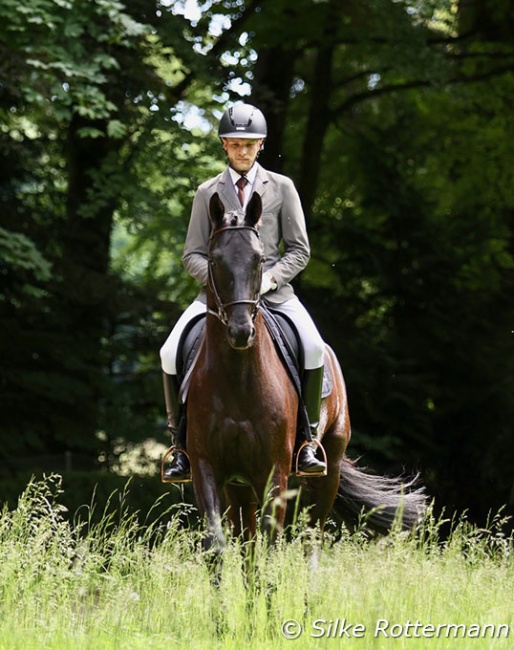
- By Max Jaquerod and Silke Rottermann
This article series documents the progress the Swiss warmblood dressage horse Fantastico (by Frascino) is making in his training under classical dressage rider Max Jaquerod. The series started in September 2023 when "Fanti" was bought until now. The text is written by Fanti's rider Max with an introduction from Eurodressage's history whizz Silke Rottermann.
Part V - Why Compete Today if You Want to be a Classical Dressage Rider?
The dressage world of today seems to have roughly divided itself in two large groups: Those who compete and those who firmly reject the world of dressage competition. Many in the latter group indulge in their universes of different styles, all claiming to be following "classicism," even though this term is not clearly defined.
It has not always been like that. In the first part of the 20th century, when the FEI started to organize dressage competitions, the cavalry institutions sent their best representatives. Cavalry trainers and riders from the Spanish Riding School successfully trained Olympic riders. They had their common basis in exactly the classical principles which were also written down in the original FEI dressage rulebook, even though national styles varied to a certain extent.
While there were regular points of contact between both worlds back then, it is very rare in today’s equestrian world that a "follower" of classical dressage (based on the classical principles which the FEI dressage rule-book used to mirror) makes the effort to put his horse’s training to the test by competing with those who focus on dressage as a competition sport.
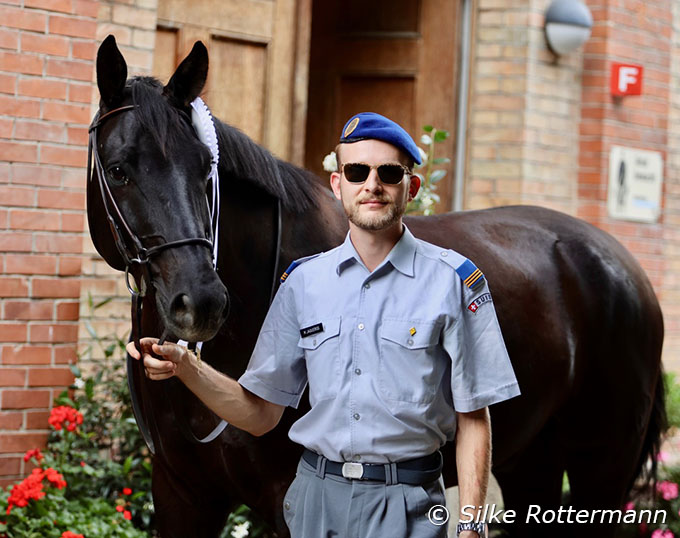
main inspiration to compete
Nowadays classical dressage trainers often have no points of contact with the sport anymore. A few are not shy of slashing the doubtable developments in dressage competition, yet they fail to set the good example by competing or at least sending students out there in the world of dressage competition. Instead of paying lip service they could set the good (counter) example of what they loudly criticize, mainly on social media.
Let ourselves not be fooled by believing that decades ago the situation was completely different, even though we often read exactly that these days. Dressage competition and the classical ideal were never completely the same in practice and already many decades ago there were occasionally clear contradictions between the classical art of riding and dressage competition.
"The basis for the sport like for equestrian art should be the correctly moving horse. But in dressage sport we often see that horses who do not move correctly get high marks," said German vet Udo Bürger, who authored the book "Way to Perfect Horsmanship" back in 1959.
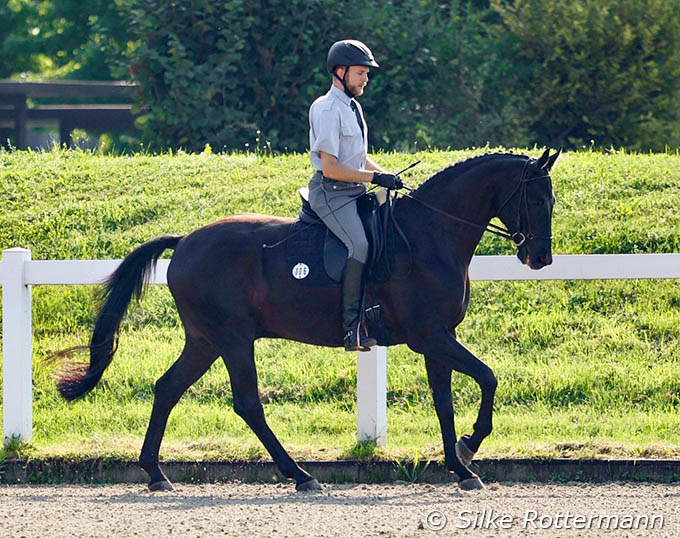
, you have to go out and compete, because nobody
watches you at home
Admittedly classical principles are not a necessity anymore to become successful, but more so a horse with extraordinary movements and great natural balance. As a result the differences between both groups have occasionally become a diametrical contradiction.
So what spurs an outspoken lover of classical dressage like Max Jaquerod who owns a nice, but not at all spectacular moving horse to regularly dive in a world of competition, which is quite far from his standards?
Why Venture Into the Show Ring as a Classicist?
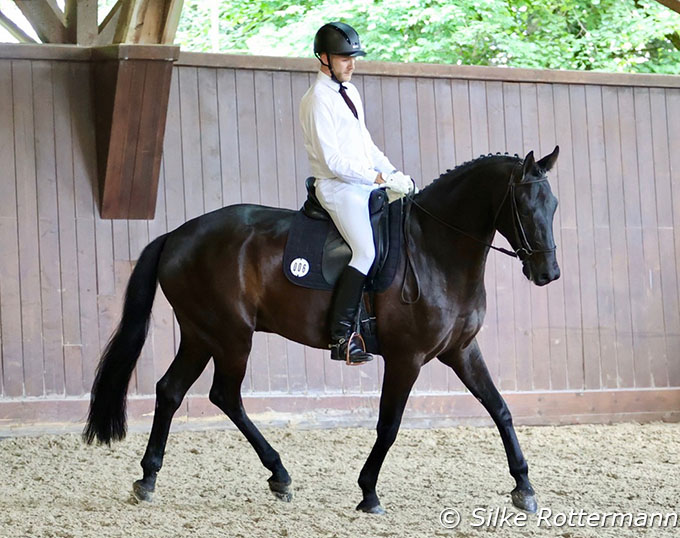
the moments when it counts, but every riding session
has to be dominated by it as much as possible.
Fanti being warmed-up for an elementary class in the
summer of 2024.
I still do not train my horse to compete, but rather I compete because I want to complete my horse's training that way. I took over Fanti from the Swiss Army in the early summer of 2023 and quite soon started him in novice classes in which he promptly won and placed well several times in the early stages of our partnership.
I still have to overcome and motivate myself to attend shows as it is simply not my world. I often experience an atmosphere of envy there and I find the lack of camaraderie at dressage shows rather uncomfortable. For that reason I do not even come home enthusiastically when a show was successful for us. The main goal for me is to follow the classical training principles and be the best I can in turning them into practice, also at a show. That is my heartfelt aspiration.
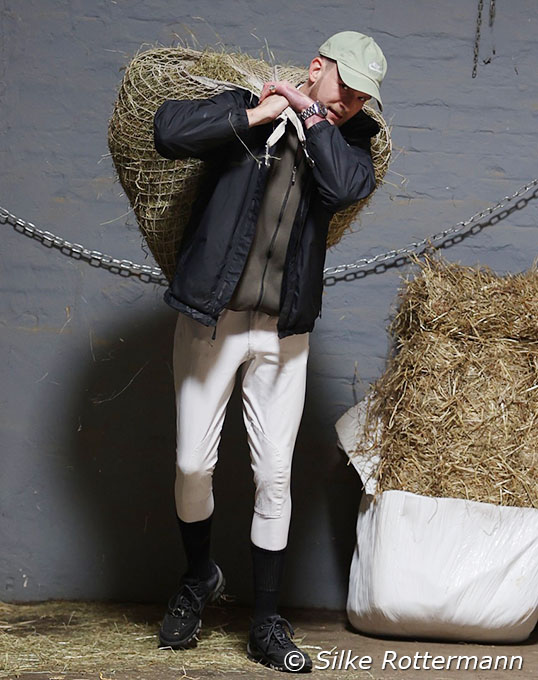
weekend morning starts when others have a
well deserved lay-in after a working week
Recently I saw a quote of Portuguese legend Nuno Oliveira on social media which was taken from an interview he gave back in the 1970s. I paraphrase by saying he claimed that competitions destroy the spirit of the horse and mechanize them to the extreme. While I personally agree that this had been and more than ever is the great danger, it particularly calls out those riders who reduce training to drilling the movements required in a test.
For me training is never teaching a horse movements because they are part of a program which I need to ride at a show. This is not training because it always ends in mechanization which can indeed make horses look like "machines without a soul" (Nuno Oliveira). However, if you only train and ride at home, the danger is one looses focus. Training a horse means to give the horse the time he needs, but also to set yourself clear goals for the horse’s training and take stock after a reasonable frame of time: Have I come where I wanted tobe or do I need to correct the course a bit? Purely training at home increases the temptation to neglect weak spots of the horse or leave them out altogether, even though they are needed to progress.
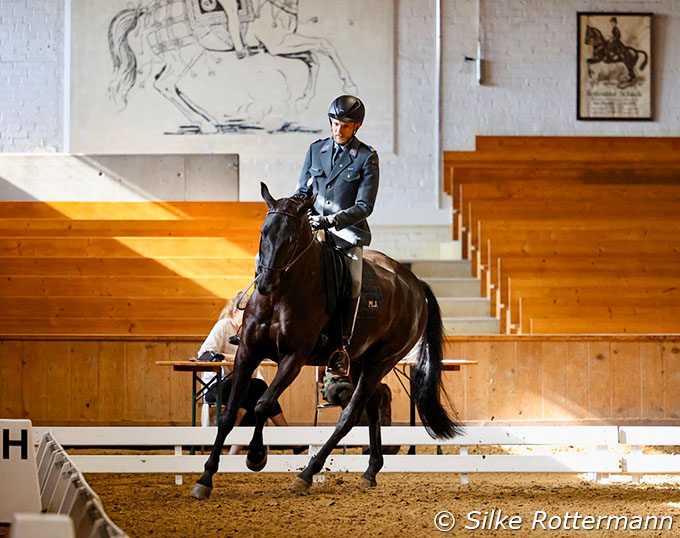
for the correct training of the horse for others:
Passing a corner correctly as a quarter volte
at the Swiss Army championships 2024
As a rider I therefore get a very important feedback about my training when I go to a show: Is my horse able to remain calm and through even in more difficult circumstances like unknown surroundings? Executing a whole program in a harmonious and refined style instead of forcing a millimeter obedience with hands and legs, imposes high requirements regarding rideability and throughness. If I am able to fulfil my own high demands regarding my horse’s rideability and throughness in a slightly more nervous situation which comes when showing away from home and in front of judges, then I know we are on a good way in our daily training. The judgement of the judges as such is of less meaning to me. Of course I want to be the best I can with Fanti and I am happy if judges acknowledge my work.
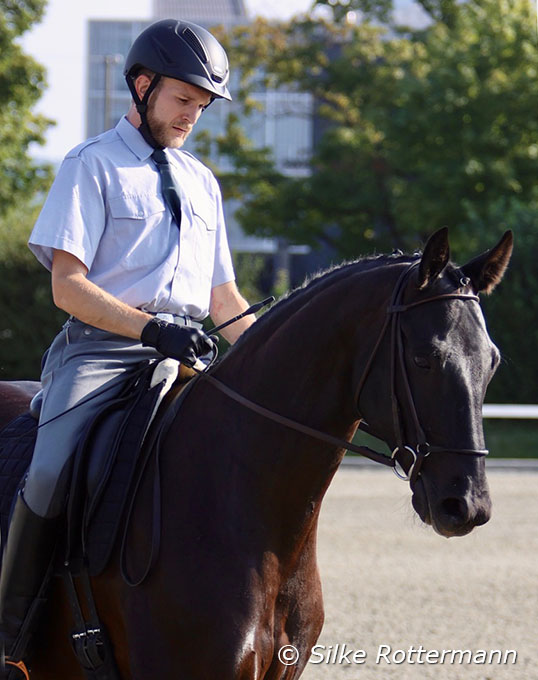
Berne, September 2024
The Crux with Being A Classicist Amongst Sport Riders
I would lie if I were to claim I only go to shows to test my horse. I also want to showcase my horse’s training and, of course, I am happy if it is acknowledged by the judges. However, controversies have their root exactly there. Dressage sport has expanded beyond recognition of what the sport was decades ago.
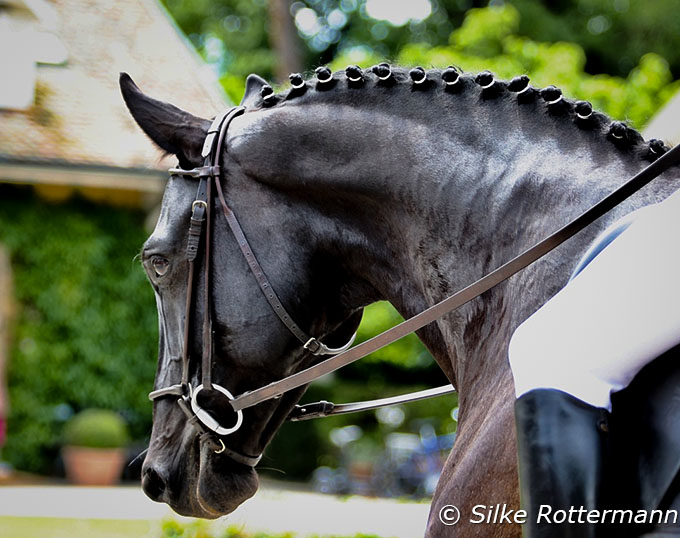
level at a show near Geneva in June 2024
Additionally in the past twenty years the quality of dressage horses has gone through the roof. As a result there is the danger that some judges are easily blinded by the extraordinary quality of gaits and in turn ignore a faulty basic training. For me personally this means that sometimes the excellent quality of highly refined warmbloods helps riders to be successful, without these horses having had a really correct training. Does it mean that a rider with a more ordinary horse, but correct training, does not stand a chance?
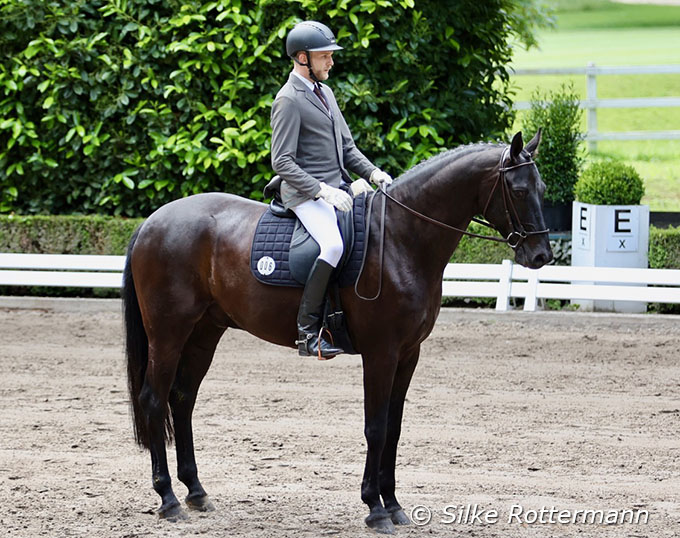
With an average moving horse the correct execution of the
movements is paramount to keep up
Harmony yet "Too Open in the Frame"
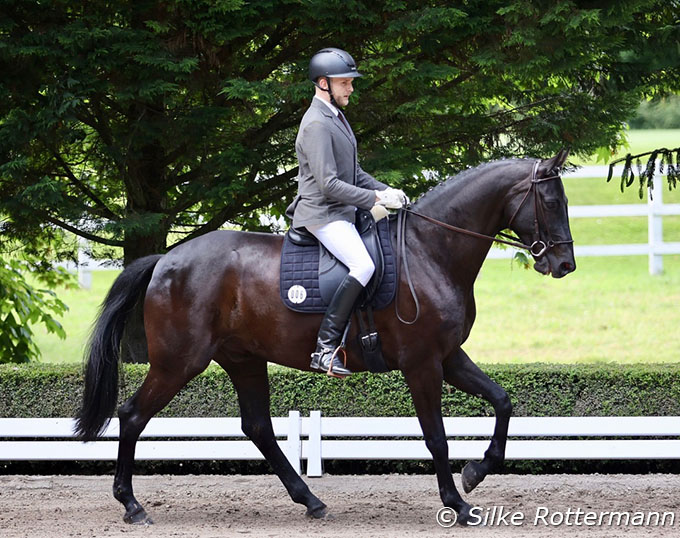
Judges’ opinions differ
However, harmony and lightness are only the results of me presenting my horse in the best self-carriage and the most refined contact possible, which completely contradicts with occasionally mentioned criticism in my protocols that state my horse is "not enough through the poll."
For me this means that harmony and lightness only get acknowledged as long as I remain without technical faults. As soon as I make a mistake, the protocols also read "horse is too open in the frame" or "horse presented too freely" which makes it obvious for me that these judges reduce faults to my riding style. These comments often only refer to the overall impression of my horse, any possible technical consequences in the movements were never named to this day.
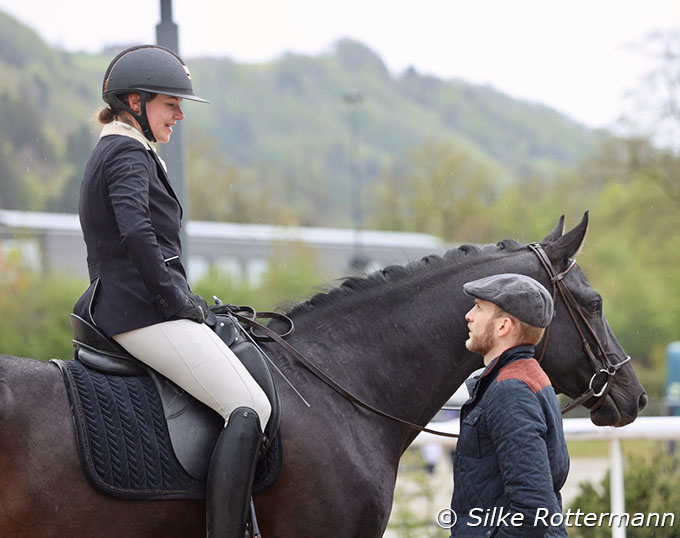
Ivana showed Fanti in April 2024 at a show
near Thun.
This zooms in on what the general problem of competition in our day is, when not following the modern mainstream riding which is usually characterized by horses being presented - contrastingly to my own horse - in very round frames and often in a certain tension which makes their gaits even more spectacular.
On To 2025 Season
Looking back on the 2024 I can report that Fanti achieved placings at novice level with my girlfriend Ivana and at elementary level with me. At the very end of the season I debuted him at medium level.
He also won the Swiss Army dressage championships during the "Train Days“ in September in front of our door step in Berne and placed second in his first Working Equitation class at novice level with Ivana at which his rideability came to full fruition.
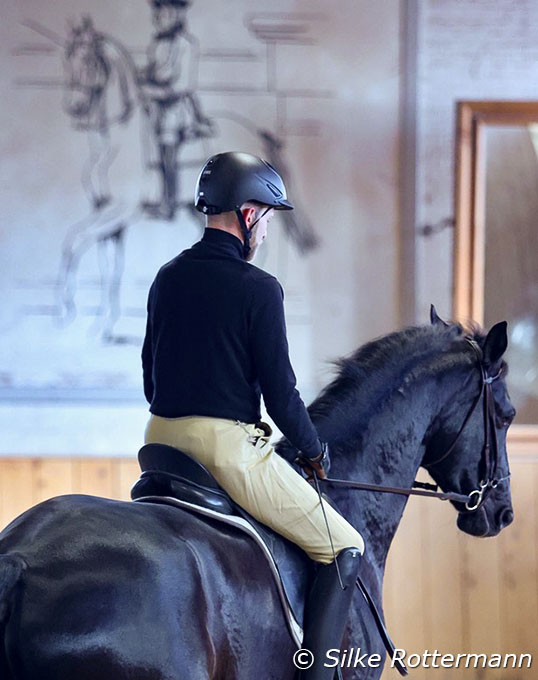
the first day of 2025.
As I write these lines, winter training is going the right way and we're ready for spring. Fanti is working on advanced movements such as flying changes in series and half canter pirouettes. He has clearly gained more strength in the past year which also shows in the improved quality of his trot extensions. As a result also his self carriage improved. We are going to continue showing at dressage competitions and as Fanti feels comfortable with the more demanding movements we will start at medium level in 2025.
And while Silke started the article with Udo Bürger, I hand over the word to this remarkable man at the end of this article. Almost 70 years ago he wrote in „The Way to Perfect Horsmanship“ "If it sometimes looks like sport distances itself from the art and if we do not like many things at competitions, we still have to see that the sport is where art can express itself."
Reference: Udo Bürger, Vollendete Reitkunst, Berlin and Hamburg 1959.
Photos © Silke Rottermann
Related Links
Fanti's Progress - What Good Dressage Training Can Do to a Horse
Fanti's Progress Part II: "The Rider Must Control Himself Before He Can Control His Horse"
Fanti's Progress - Part III: "Taking a Step Up While Refining the Basics"
Fanti's Progress - Part IV: A Three-Day Training Stint with Anja Beran